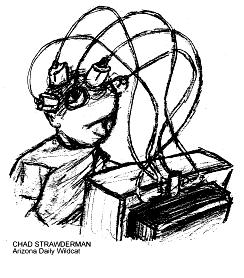![]()
![[ OPINIONS ]](/images/fall97/opinionsf97.gif)
![]()
By Brad Senning
Arizona Daily Wildcat September 30, 1997
IQ Boosting
![[Picture]](05_1_i.gif)
Brad Senning |
Leslie Nielson, playing the commander of United Planets Cruiser C57D in
the movie "Forbidden Planet," surveys a remote planet in a remote
solar system only to find a remote colony inhabited by a philologist named
Dr. Morbius and his gorgeous, highly intelligent daughter Altaira. No 1950s
Hollywood movie being complete without a Technicolor romance, Leslie Nielson
falls madly for the remarkable Altaira.
Yet he feels some amount of intellectual inadequacy: Leslie Nielson may be the commander of a space cruiser, but he's no rocket scientist. "A commanding officer doesn't need brains," Dr. Morbius muses, "just a good, loud voice."
Then Leslie Nielson learns that Dr. Morbius has an "electronic educator" in his lab which simultaneously measures and "boosts" IQ scores.
"Forbidden Planet" contemplates, perhaps unintentionally, whether mankind can "educate" himself to a higher brand of intelligence, and whether we should.
IQ testing was formalized in 1905. Since then, the majority of psychologists have believed there is a basic, genetically determined property of intelligence in the brain which the most accurate IQ tests come close to measuring.
IQ testing soon gained popular affection. During the years of 1917-18 more than 1 million WW I Army recruits were tested. Roughly 25 years later, the Army tested its WW II recruits. The average IQ score, between the two wars, had risen 12-14 points.
The results aren't limited to those who carry guns. Worldwide, IQ scores have increased at a rate of 3 points per decade.
What has catapulted this intellectual renaissance?
"Perhaps the most striking 20th century change in the human intellectual environment," Uric Nessier states in the article "Rising Scores on Intelligence Tests," "has come from the increase in exposure to many types of visual media." We crowd our walls with pictures and posters. We watch television and go to movies and play video games. We surf web sites. "Each successive generation has been exposed to far richer optical displays than the one before." Even the landscape of those tried and true visual displays have fractured into movie jump-cuts and bite-sized, 15-second commercials.

How this clamor of images has increased our IQ requires a bit of clever guessing. Neisser states, "Beyond merely looking at pictures, we analyze them." Beyond that, we are forced to make analogies, relating the stuff we are currently looking at with stuff we've seen previously; or we write ourselves into the photographs we look at, superimposing the objects of our cathexis with imaginative, new self-images.
There has never been a better argument for the cacophonous roar of images than the assurance that it's boosting (like a cushion under a toddler's buttocks) our intelligence. The engine of modern society is often deafening as it drives forward.
There's a theory that the use of lead pipes contributed to the fall of the Roman Empire. Its citizens were poisoned by a hasty impulse toward modernized plumbing, having never looked beyond the impressive benefits. Kurt Vonnegut, in a recent interview, associated this theory with his own theory about contemporary, TV-conscious society. In some way he balks at articulating, television will ultimately contribute to our downfall. Maybe television has the capacity - like lead poisoning - to turn our gums blue.
Novelist Don DeLillo confronts media images directly in recent interviews and articles publicizing his new novel Underworld. News images, in his estimation, are mass-marketed products. Far from analyzing these images, we consume them; we are exhilarated by them. Moreover, these news images are becoming more gruesome. We gather around the television to watch two armed civilians tenderize L.A. police officers just as former generations gathered to see a man walk on the moon. "We depend on disaster to consolidate our vision."
Yet DeLillo attacks the very source of his creative energy. Certainly he has gained fictional prowess by the aid of images he severely denounces.
The most accurate assessment of our image-centered society must allow room for paradox. The poet John Ashbery embodies the contemporary paradox in two lines of his poem, "They Dream Only of America." These two lines convey a thought pattern much as an impressionist would, allowing sensations to be unveiled as they would naturally occur: "This honey is delicious/ Though it burns the throat." One line is the immediate benefit, the next the repercussion. We have no idea, as we are tasting the honey, that it is laced with strychnine. The Roman had no idea, as he quenched his thirst from a sputtering tap, that he was getting lead poisoning. The family of five sitting before the newscast of today's airline collision doesn't feel the violence desensitizing them to more (instant replay, please!) violence. And Leslie Nielson had no idea, while playing the romantic lead in a science fiction thriller, he might someday share a starring role in a comedy with running back O.J. Simpson.
Do the possible repercussions lose meaning when we consider the immediate gratification of increased intelligence?
IQ tests don't measure intelligence, but only an "abstract problem-solving ability," writes James Flynn, a political scientist. The trend of increasing IQ is only indicative of our increasing ability to take tests better than our parents and grandparents. We aren't living in an era of intellectual renaissance. We don't even have the benefit of increased intelligence to outweigh the specious throng of eyesores.
Among the intersection of visual images we are only bystanders. We are only improving our ability to perceive more images, be a better image "consumer." Our society, then, is built on a certain faith. We can't know whether we are going down the right super-highway, or if it's doing us any good. But we are most comfortable in a state of pure trust. And that's the beauty (and downfall) of our consolidated delusion.
Brad Senning is a senior majoring in American literature and creative writing.



